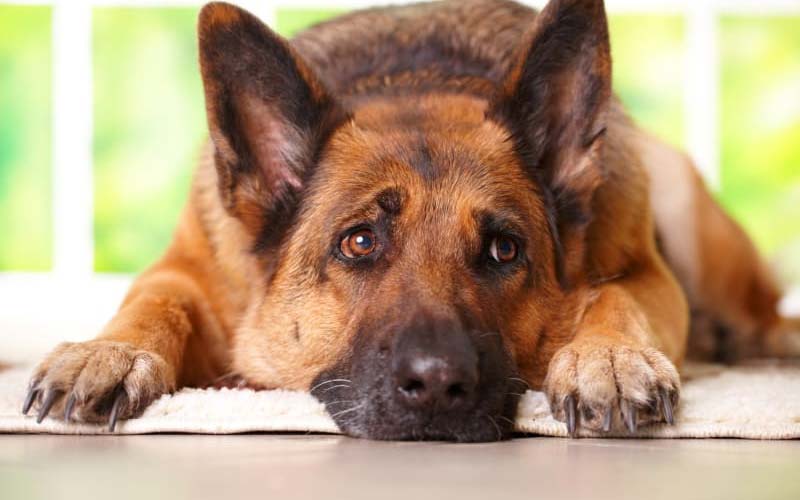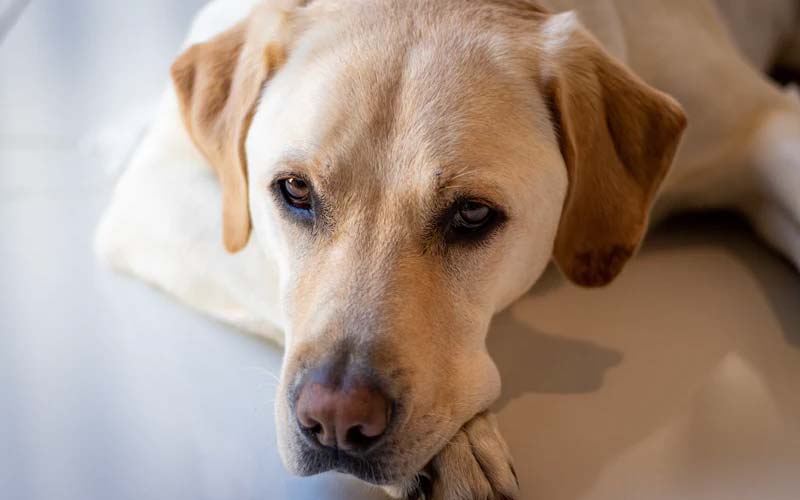A dog’s digestive health is crucial for their overall well-being. When your furry friend struggles with constipation, it can lead to discomfort, restlessness, and even potential health risks if left untreated. While severe cases require veterinary attention, many instances of constipation can be effectively managed at home with safe, natural remedies.

This article will guide you through identifying the signs of constipation in dogs, understanding its common causes, and applying simple, effective solutions to alleviate their discomfort. By the end, you’ll have the knowledge to not only help your dog feel better but also prevent future episodes—keeping their digestive system running smoothly.
1. Recognizing the Signs of Constipation in Dogs
Understanding the symptoms of constipation in dogs is the first step to addressing the issue effectively. While occasional irregularity can happen, persistent signs of constipation should not be ignored. Here are the key symptoms to watch for:
Straining During Bowel Movements
- If your dog appears to strain excessively or spends a lot of time trying to defecate without success, it’s a clear indication of constipation. This can be accompanied by whining or visible discomfort.
Small, Hard, or Dry Stools
- Dogs with constipation may pass small, pellet-like stools that are dry and hard. This texture suggests a lack of moisture in their digestive system, making elimination difficult.
Reduced Frequency of Defecation
- A dog that skips bowel movements for more than a day or two may be constipated. Regularity depends on diet and activity level, but a significant change in their routine is a red flag.
Bloating or Signs of Discomfort
- Constipation can lead to bloating, abdominal swelling, or a hunched posture. You may notice your dog seems lethargic, avoids physical activity, or shows signs of mild pain when touched near the stomach.
Why Early Detection is Key
Spotting these symptoms early is essential to prevent complications. Left untreated, constipation can escalate into more severe issues like obstipation (complete blockage) or megacolon, which may require medical intervention. Early detection allows you to address the problem with simple remedies before it worsens, ensuring your dog’s comfort and health.
By being vigilant about these signs, you can act promptly to help your dog feel better and maintain a healthy digestive system.

2. Common Causes of Constipation in Dogs
To effectively address and prevent constipation in dogs, it’s important to understand its common causes. Identifying the root of the problem allows you to apply targeted solutions and make necessary lifestyle adjustments. Below are the primary factors contributing to canine constipation:
Diet-Related Issues
A dog’s diet plays a significant role in maintaining healthy digestion.
- Lack of Fiber: Fiber is essential for regulating bowel movements. Diets that are low in fiber can lead to hard, dry stools and difficulty passing waste.
- Overconsumption of Bones or Hair: Dogs that chew and ingest bones or groom excessively (leading to hair ingestion) are at risk of developing blockages that slow down their digestive processes.
Dehydration
Water is crucial for softening stool and facilitating its passage through the intestines. If your dog isn’t drinking enough water, their stool can become dry and hard, making elimination challenging. Dehydration is often exacerbated in hot weather or after strenuous activity.
Lack of Exercise
Regular physical activity promotes healthy digestion by stimulating intestinal movement. A sedentary lifestyle can slow the digestive system, increasing the likelihood of constipation. Dogs that don’t get enough exercise may experience irregular bowel movements as a result.
Medical Conditions
Certain health issues can contribute to constipation, including:
- Aging: Older dogs often experience slower metabolism and reduced digestive efficiency, making them more prone to constipation.
- Medications: Some drugs, particularly pain relievers and certain sedatives, can cause constipation as a side effect.
- Underlying Illnesses: Conditions like an enlarged prostate, spinal injuries, or anal gland problems can interfere with normal bowel movements.
Foreign Object Ingestion
Dogs are naturally curious and may ingest non-food items such as toys, rocks, or fabric. These foreign objects can cause obstructions in the intestines, leading to severe constipation or even life-threatening blockages.
By understanding these causes, dog owners can take proactive steps to mitigate risks, such as adjusting diets, encouraging hydration, and promoting regular exercise. In cases of medical conditions or suspected foreign object ingestion, prompt veterinary attention is essential.

3. Safe Home Remedies to Relieve Constipation
When your dog is constipated, several simple, safe remedies can help alleviate their discomfort. These solutions focus on hydration, dietary adjustments, and gentle interventions to stimulate digestion. Here’s how to get started:
Hydration Boosters
Proper hydration is essential for softening stools and promoting regular bowel movements.
- Importance of Water: Ensure your dog has constant access to fresh water, as dehydration is a common cause of constipation.
- Low-Sodium Broth: If your dog is reluctant to drink plain water, try offering low-sodium chicken or beef broth. The savory flavor can encourage them to stay hydrated while also adding moisture to their digestive system.
Dietary Adjustments
A balanced diet rich in fiber can help regulate your dog’s digestion.
- Plain Canned Pumpkin: Add a small amount of unsweetened canned pumpkin to your dog’s meals. Its natural fiber content can help soften stools. Start with 1–2 teaspoons for small dogs and up to 1–2 tablespoons for larger breeds.
- Cooked Vegetables: Introduce small quantities of steamed or boiled carrots, green beans, or sweet potatoes. These provide fiber while being gentle on your dog’s stomach.
Natural Oils
Oils can act as mild lubricants for your dog’s digestive tract.
- Olive Oil or Coconut Oil: Mix a teaspoon (for small dogs) or a tablespoon (for large dogs) into their food. These oils help ease stool passage without causing harm. Avoid excessive use, as it may lead to diarrhea.
Massage Techniques
Gentle abdominal massage can stimulate your dog’s digestive system.
Step-by-Step Guide:
- Have your dog lie comfortably on their side.
- Use your fingertips to apply gentle pressure to the lower abdomen, just below the ribs.
- Massage in small, circular motions for a few minutes, ensuring your dog is calm and relaxed throughout.
- Avoid applying too much force, as this could cause discomfort or harm.
Exercise and Movement
Physical activity is an excellent way to encourage digestion.
- Suggested Activities: Take your dog for a brisk walk, play fetch, or engage them in light running. Movement helps stimulate intestinal contractions, promoting bowel movements.
Mild Laxatives
In some cases, a mild laxative can help.
- Milk: Offer a small amount of milk (no more than ¼ cup for small dogs or ½ cup for larger breeds). Milk can act as a natural laxative but should be used sparingly, as it may upset their stomach.
- Dosage and Caution: Always consult your veterinarian before introducing laxatives, and avoid human medications that can be harmful to dogs.
By following these remedies, you can often resolve your dog’s constipation safely and effectively at home. However, if symptoms persist or worsen, seek professional veterinary advice to rule out more serious issues.

4. Preventing Constipation in the Future
Preventing constipation in your dog is easier than treating it. By maintaining good habits and being proactive, you can support your dog’s digestive health and avoid discomfort. Here are the key steps to keep your furry friend regular:
Balanced, High-Quality Diet
A proper diet is the foundation of a healthy digestive system.
- Fiber-Rich Foods: Ensure your dog’s diet includes adequate fiber, which promotes smooth digestion. Many high-quality commercial dog foods are formulated to support digestive health, or you can add natural fiber sources like plain canned pumpkin or cooked vegetables.
- Avoid Overfeeding: Stick to appropriate portion sizes to prevent overloading their system. Regular feeding schedules also help regulate digestion.
Encouraging Hydration
Proper hydration is critical for soft stools and healthy bowel movements.
- Accessible Water Sources: Always provide clean, fresh water for your dog. For picky drinkers, consider adding low-sodium broth to their water or using a pet water fountain to encourage drinking.
- Moisture-Rich Foods: Incorporate wet dog food or water-rich snacks like cucumbers or watermelon (seedless and in moderation) to supplement hydration.
Regular Exercise Routines
Physical activity plays a major role in promoting healthy digestion.
- Daily Walks and Playtime: Regular walks and interactive play help stimulate your dog’s intestines, reducing the likelihood of constipation.
- Consistency: Stick to a daily schedule to build healthy habits and maintain their energy levels.
Avoiding Risky Foods and Indigestible Items
Certain foods and objects can disrupt digestion and lead to constipation or worse.
- Risky Foods: Avoid feeding your dog bones, fatty scraps, or foods high in sugar and salt, as they can cause blockages or digestive upset.
- Indigestible Items: Prevent access to non-food items like toys, rocks, or fabric. Supervise your dog during playtime and discourage behaviors like chewing on inappropriate objects.
By providing a high-quality diet, ensuring proper hydration, maintaining regular exercise, and avoiding risky items, you’ll significantly reduce the chances of constipation in your dog. These simple yet effective steps will support their digestive health, keeping them comfortable, happy, and active.

5. When to Seek Veterinary Help
While many cases of constipation in dogs can be managed with home remedies, there are instances where professional veterinary care is necessary. Recognizing the warning signs that your dog’s constipation may require more intensive treatment can help prevent complications and ensure your pet receives the appropriate care.
Warning Signs That Home Remedies Might Not Be Enough
Constipation Lasting Over 48 Hours
- If your dog has been constipated for more than two days despite your efforts to relieve it, it’s time to consult a veterinarian. Persistent constipation can lead to more serious conditions like obstipation, where the colon becomes severely impacted, or even cause damage to the intestines if left untreated.
Blood in Stool or Severe Discomfort
- The presence of blood in your dog’s stool or severe signs of discomfort such as constant whining, excessive straining, or unwillingness to move are cause for concern. These could indicate a more serious issue such as an infection, injury, or gastrointestinal disease, requiring immediate veterinary attention.
Additional Symptoms Like Vomiting or Lethargy
- If constipation is accompanied by vomiting, loss of appetite, lethargy, or signs of abdominal pain (like a distended belly), it’s important to consult a vet. These symptoms suggest that there may be an underlying health issue, such as a gastrointestinal obstruction or systemic illness, which requires professional diagnosis and treatment.
The Importance of Professional Care for Chronic or Severe Cases
Chronic constipation or severe cases can lead to more serious complications that may not resolve with simple home remedies. Veterinary care is essential for addressing issues like:
- Underlying Medical Conditions: Conditions such as hypothyroidism, diabetes, or kidney disease can cause or worsen constipation.
- Obstructions: A foreign object stuck in the intestines or a structural issue like megacolon might require surgical intervention.
- Dehydration and Electrolyte Imbalance: Severe constipation can lead to dehydration, which may need to be managed with intravenous fluids and other medical treatments.
If you suspect your dog’s constipation is not improving or is accompanied by concerning symptoms, do not hesitate to seek veterinary help. Prompt intervention can prevent further complications and ensure your dog’s health is fully restored.

Conclusion: Helping Your Constipated Dog Without a Vet Visit
Constipation can be an uncomfortable and distressing experience for your dog, but with the right approach, many cases can be managed safely and effectively at home. By recognizing the signs of constipation early, understanding the common causes, and applying simple home remedies such as hydration boosters, dietary adjustments, natural oils, and gentle massage techniques, you can help alleviate your dog’s discomfort.
Preventing future episodes is just as important—ensure your dog enjoys a balanced, high-quality diet, regular exercise, and easy access to fresh water. Avoiding harmful foods and indigestible items also plays a crucial role in maintaining healthy digestion.
However, if your dog’s constipation persists beyond 48 hours, or if you notice severe symptoms like blood in the stool, vomiting, or lethargy, it’s essential to seek veterinary care. Chronic or severe constipation may require professional attention to prevent long-term health issues.
By staying vigilant, proactive, and informed, you can help your dog live comfortably and enjoy a happy, healthy life. If you’re ever uncertain or concerned about your dog’s health, don’t hesitate to reach out to a veterinarian for guidance.